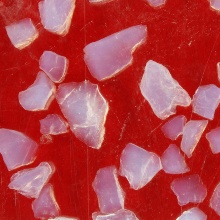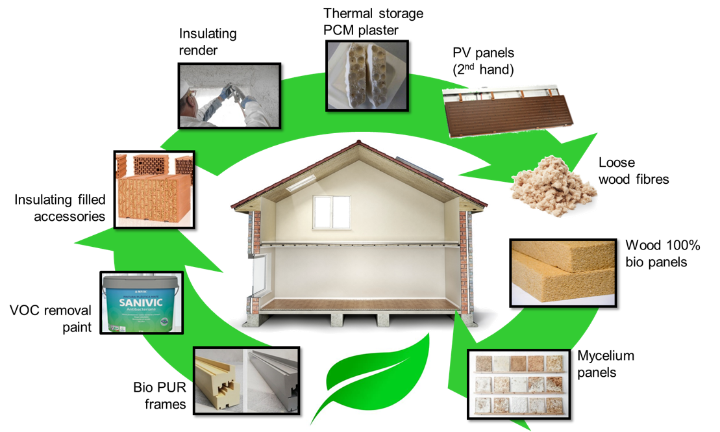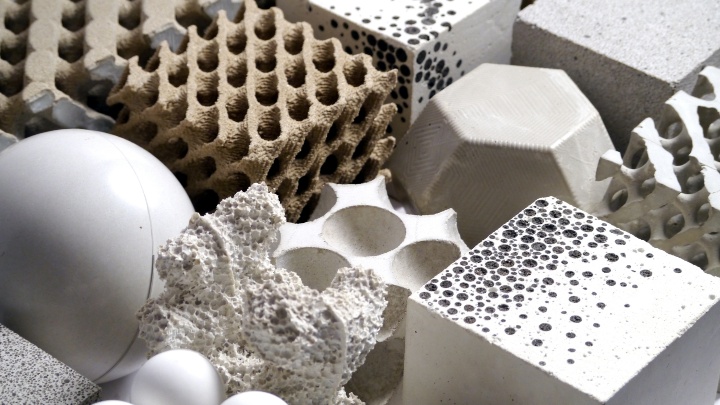Your professional partner
Resource scarcity and climate change require a reorientation of the materials management towards sustainable production processes. In an age of increasingly scarce resources, we have a great responsibility to develop sustainable products that protect our environment. Therefore, it is important in future to focus on renewable resources, circular economy and energy-efficient processes.
The Units in our Department
-
Climate, Comfort, Pollution
We conduct research in the field of indoor environment quality with regard to both comfort and health aspects. This is a central issue of the energy transition for new buildings and renovated existing buildings, due to more and more tight building envelopes. The focus is on modern materials for highly efficient thermal insulation and moisture and temperature storage, as well as the identification of gaseous and particulate pollutants in indoor environments.
Your contact: Dr. Jürgen Frick
-
Transport Infrastructure
Germany has one of the most efficient transport infrastructures in Europe. This is the basic prerequisite for high mobility, which in turn is a prerequisite for economic growth, employment and the participation of individuals in society. In this context, the maintenance of the continuously growing infrastructure is of central importance, since the impairments of the infrastructure are becoming more and more severe due to increasing demands and an increasingly unfavorable age structure of the road and bridge substance. With thought leaders, visionaries and selected scientists the division faces these new challenges and thus sends the right signals to the industrial partners.
Your contact: Dr. Oliver Mielich
-
Green Engineering
Your contact: Dr. Cristóbal Tapia Camú
Tasks and technical focus
Innovative or complex issues may require testing outside the known horizon. We offer you the conceptual design, implementation and scientific evaluation of examinations in our areas of expertise that expand the state of knowledge.
Current research projects
- Economic feasibility studies on construction methods with concrete slabs of the load class Bk100
- Betonfahrbahn 4.0 (BASt)
- Creep of SAP-modified concrete
- EASI ZERo
- Exploit4InnoMat
Completed research projects since 2015
- EU project SensMat
- KomZet-SHL
- WALL-ACE - Novel Nanomaterials Efficient systems (EU Horizon 2020), https://www.wall-ace.eu/
- HOME Skin - Thinner Insulation Systems (EU Horizon 2020), https://homeskin.net/
- Low Embodied Energy Insulation Materials
- Creep of concrete under the influence of an alkali-silica reaction
- Diagnosis, demolition, processing and recycling of ASR-damaged road pavement concrete
- Bond between steel and concrete under the influence of fire
Room climate stabilisation for the preservation of the wall paintings in the church St. Georg (UNESCO - World Cultural Heritage Site Monastery Isle of Reichenau) - DBU AZ: 32712/01
An interdisciplinary team from the fields of monument preservation, conservation, natural sciences and engineering examined the potential dangers to early medieval wall paintings because of climate fluctuations. Measurements of the exposure to salts, microbial infestation and dust particles provided far-reaching insights into the damage mechanisms. Among other things, indoor air monitoring provided information on the relationship between dust pollution and visitor traffic. The main component of the project was a climate monitoring and a controlled conditioning of the indoor climate conditions in the crypt and nave based on this as a contribution to the long-term preservation of the wall paintings.
Further information: https://www.denkmalpflege-bw.de/denkmale/projekte/bau-und-kunstdenkmalpflege/restaurierung/st-georg-reichenau/st-george-reichenau/
Publication: https://www.baufachinformation.de/unesco-weltkulturerbe-reichenau/buecher/247360
EU Horizon 2020 Project: SensMat - Preventive solutions for Sensitive Materials of Cultural Heritage
Preventive conservation is an important approach to the long-term preservation of cultural heritage, in particular for artefacts currently exhibited under unsuitable environmental conditions in small and medium-sized EU museums. SensMat aims to develop and implement innovative, cost-effective and user-friendly monitoring tools, including a decision support tool for museum management and collection preservation staff. The international and interdisciplinary SensMat consortium comprises 18 partners from five European countries. The SensMat concept is based on new, cost-effective sensor systems and innovative data and communication networks (IoT) that monitor collection environments and continuously evaluate specific material degradation. The MPA is leading the multiscale modelling work package, which will provide the basis for the detection of degradation risks and validate the monitoring systems developed. Representative case studies in museums, historical buildings, depots and workshops (in Denmark, France and Austria) will be used for testing in a real museum context. Relevant actors from cultural institutions, regional associations, certification organisations, academies, museums and industrial enterprises will be involved.
Duration: 01.01.2019 to 28.02.2022.
Further information: https://www.sensmat.eu/
KomZet SHL BW - Development and operation of a (virtual) Competence Centre for Market and Business Processes Smart Home & Living Baden-Württemberg
The Smart Home & Living Competence Center is to cover the central aspects of opening up the Smart Home & Living market in Baden-Württemberg for the relevant market partners on the supply and demand side and to promote the introduction of Smart Home & Living solutions in all regions and among the important target groups. The following subprojects will contribute:
A business model incubator to generate business models
A central obstacle to the spread of SHL solutions lies in the lack of knowledge of suitable business models that partners from the housing industry, trades and social enterprises can use through cooperation. Here, a specially developed business model incubator will eliminate existing deficits.
A Smart-O-Mat as a consulting aid for providers and customers
A second sub-project has the task of developing the Smart-O-Mat, a tool that informs potential users of SHL solutions about their functionalities, whereby the customer is offered the solution that suits him according to his preferences. The well-known Wahl-O-Mat is the model for this.
A communication platform for information about SHL solutions
The sub-projects, Business Model Incubator and Smart-o-Mat provide insights and results that will be communicated to all relevant stakeholders in the Information and Communication sub-project. Target groups are both providers and users of SHL solutions. These include private individuals, but also institutions working in the field of assisted living or supporting people in need, as well as other users in the commercial sector and potential providers of SHL solutions such as artisans, planners, architects and social enterprises.
Training for employees in the crafts and housing industry
Since, due to previous experience, trained specialists are active on the market, but the employees in the crafts and housing industry do not have sufficient knowledge, the sub-project aims to qualifying these target groups.
Duration: 9.8.2019 bis 28.2.2022. The project is funded by the Ministry of Economics, Labour and Housing Baden-Württemberg.
Further information: https://www.etz-stuttgart.de/das+etz/Wir+%C3%BCber+uns/Projekte/KomZet+SHL+BW.html
EASI ZERo – Building envelope system for efficient zero-energy renovation
With a share of 36% of CO2 emissions and an energy consumption of 40%, the construction sector is far from sustainable. The demand for building materials for climate neutral buildings in Europe is huge. The aim of the EU project EASI ZERo is therefore to advance the development of sustainable building materials for energy-efficient buildings for renovation and new construction. EASI ZERo is developing and validating an easy-to-install comprehensive system of sustainable materials for the building envelope to ensure efficient and sustainable energy renovation with a low energy footprint and CO2 emissions close to zero.
Exploit4InnoMat – An Open Innovation Ecosystem for exploitation of materials for building envelopes towards zero energy buildings
Today, the building sector is responsible for 40% of energy consumption and 36% of CO2 emissions in the EU. For this reason, the European Commission has set itself the goal of constructing near-zero energy buildings (nZEB) in the future. Innovative building materials, the "grey" energy used and the associated CO2 emissions are important key factors in order to be able to build more sustainably in Europe in the future, both in new and in existing buildings.
The Exploit4InnoMat project aims to provide a sustainable solution for the development, upscaling and validation of new material concepts across Europe. The goal is to establish an open European innovation network of testbeds and pilot lines (Open Innovation Testbeds - OITB) for building envelope materials that will facilitate the achievement of the EU's target for near-zero energy buildings (nZEB).
Flyer of the Department
How to find us
- Our location on campus
Pfaffenwaldring 4, 70569 Stuttgart - Open Street Map
Contact

Frank Lehmann
Dr.-Ing.Head of Department / Head of Unit

Oliver Mielich
Dr.-Ing.Deputy Head of Department / Head of Unit







